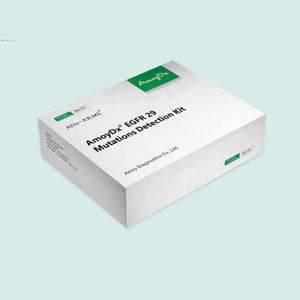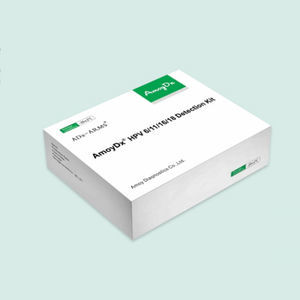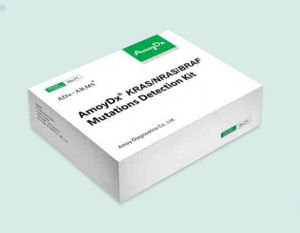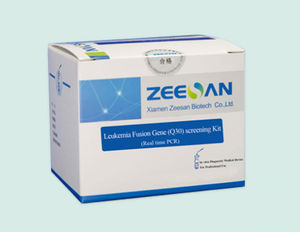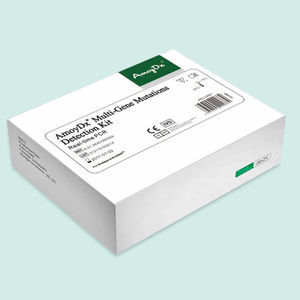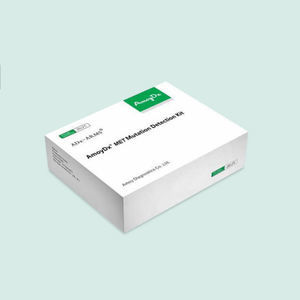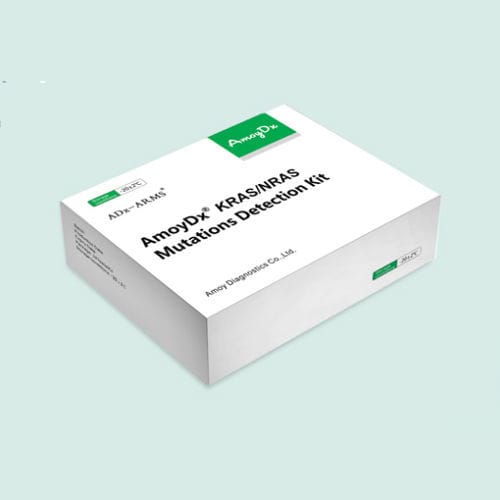
- Laboratory
- Laboratory medicine
- Colon cancer test kit
- LCM Genect srl
Colorectal cancer test kit LCMKN03apoptosisfor KRAS mutationsfor NRAS mutations
Add to favorites
Compare this product
Characteristics
- Applications
- colorectal cancer
- Application field
- apoptosis
- Tested parameter
- for KRAS mutations, for NRAS mutations
- Sample type
- cell
Description
KRAS/NRAS Mutations Detection Kit provides reagents to perform assays for 6 tests
Technical information
Detection of 19 KRAS mutations (exons 2, 3 and 4) and 13 NRAS mutations (exons 2, 3 and 4)
RAS protein is a GTPase and one of the key molecules in the downstream signaling pathway of epidermal growth factor receptor (EGFR). These pathways control cell proliferation, differentiation and apoptosis. Frequency of KRAS and NRAS mutations in colorectal cancer are 36~40% and 1~6% respectively. Most frequent mutations are in exons 2, 3 and 4.
RAS mutation is predictive of a very poor response to cetuximab (Erbitux®) and panitumumab (Vectibix®) therapy in colorectal cancer (CRC).[1] The most reliable way to predict whether a colorectal cancer patient will respond to one of the EGFR-inhibiting drugs is to test for activating mutations in the RAS gene.
A number of large studies [2][3] have shown that cetuximab has significant efficacy in mCRC patients with RAS wild-type tumors. NCCN clearly indicates that all patients with metastatic colorectal cancer should be determined of tumor RAS (KRAS/NRAS) gene status. Patients with any known KRAS or NRAS mutation should not be treated with either cetuximab or panitumumab.
Intended Use
CE marked for IVD use in Europe.
Technological Principles
The kit uses novel, patented primers and probes to detect mutations in a real-time PCR assay.
The mutant DNA is amplified accurately by the specific primers, and detected by the novel probes.
Highly Specific primers and probes, and a highly validated procedure based on Taq DNA
polymerase contribute to outstanding assay sensitivity and selectivity.
Related Searches
- Assay kit
- Blood assay kit
- Molecular test kit
- Clinical assay kit
- Optical assay kit
- Fluorescence assay kit
- Real-time PCR test kit
- Oncology test kit
- Cell assay kit
- Tissue detection kit
- Genetic test kit
- Oncology test kit
- Nucleic acid assay kit
- Real-time detection kit
- DNA assay kit
- Genetic mutation detection kit
- HPV assay kit
- FFPE tissues assay kit
- RNA assay kit
- Cellular biology assay kit
*Prices are pre-tax. They exclude delivery charges and customs duties and do not include additional charges for installation or activation options. Prices are indicative only and may vary by country, with changes to the cost of raw materials and exchange rates.


